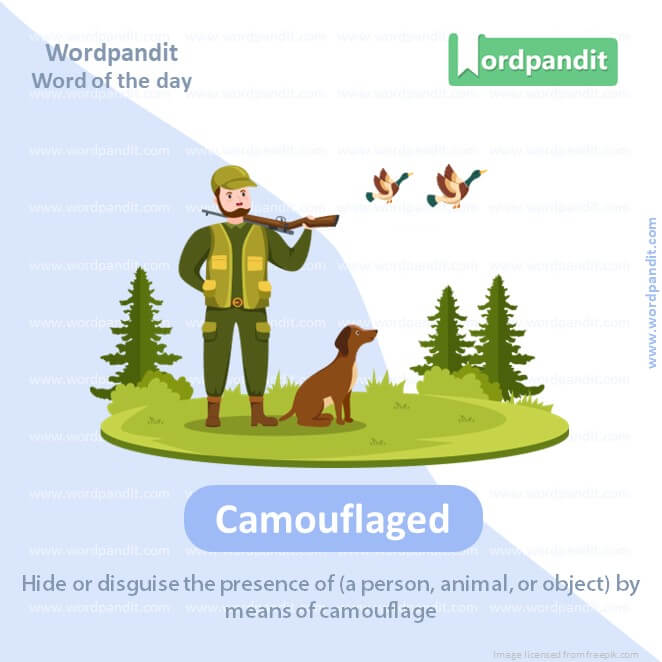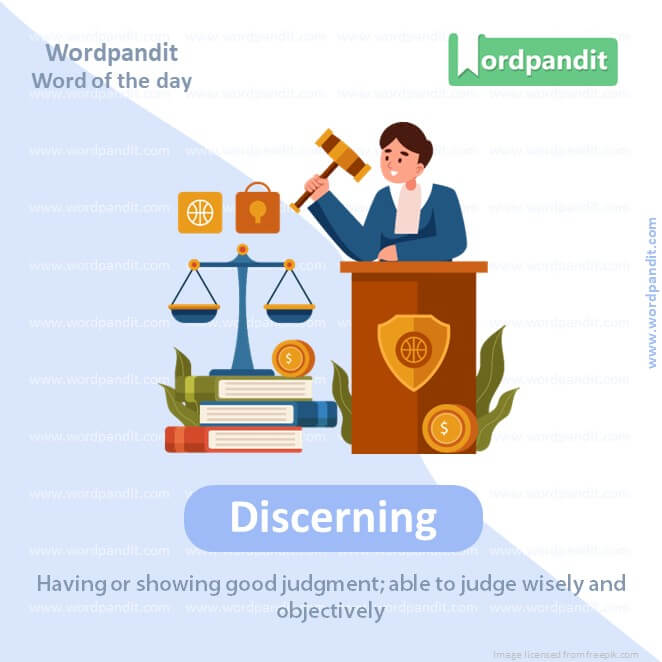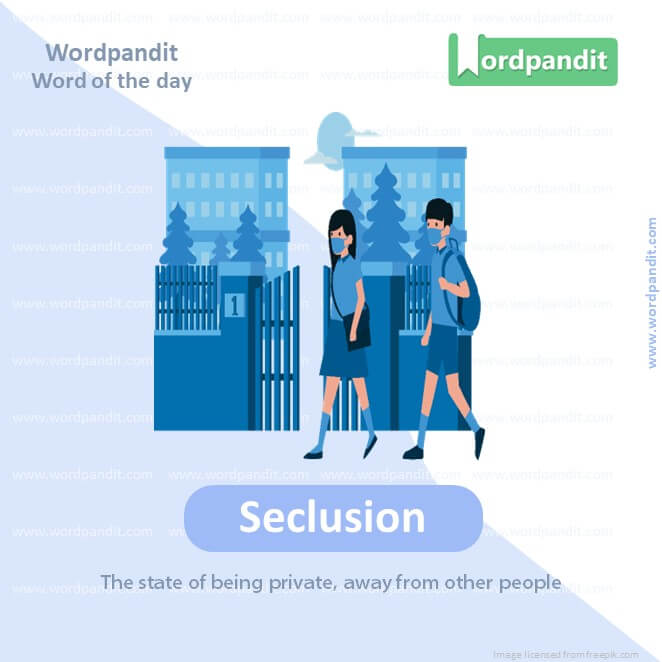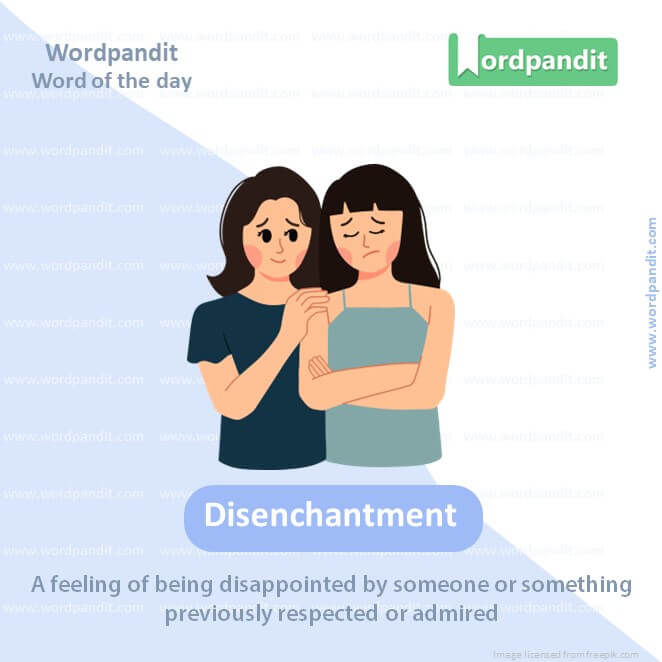Daily Vocabulary Words: List of Daily Used Words
Hi there. Welcome to this special section @ Wordpandit.
Our endeavour here is straightforward: highlighting important daily vocabulary words, you would encounter in The Hindu. This is your repository of commonly used words; essentially, we are posting a list of daily used words. Hence, this has significant practical application as it teaches you words that are commonly used in a leading publication such as The Hindu.
Visit the website daily to learn words from The Hindu.

WORD-1: CAMOUFLAGE
CONTEXT: With their natural camouflage, the endangered species have managed to avoid predators in the dense Indian forests.
SOURCE: The Hindu
EXPLANATORY PARAGRAPH: Camouflage is what you call it when something blends in with what’s around it. Like, if you have a green frog sitting on a green leaf, it’s hard to see the frog because it’s camouflaged!
MEANING: Hide or disguise the presence of (a person, animal, or object) by means of camouflage (Noun).
PRONUNCIATION: Cam-oh-flaj
SYNONYMS: Disguise, Masking, Concealment, Cover, Dissembling
USAGE EXAMPLE:
1. Soldiers often wear camouflage to blend in with their environment.
2. The leopard’s spots provide perfect camouflage in the grass.
3. The butterfly’s wings have a pattern that acts as camouflage.
4. She tried to camouflage her feelings.

WORD-2: REFERENDUM
CONTEXT: The government recently announced a referendum to decide on the implications of the new civic policies.
SOURCE: The Hindu
EXPLANATORY PARAGRAPH: Imagine if your whole class got to vote on whether class should start later. That vote is called a referendum! It’s like when everybody gets to help make a decision.
MEANING: A general vote by the electorate on a single political question which has been referredto them for a direct decision (Noun).
PRONUNCIATION: Ref-er-en-dum
SYNONYMS: Vote, Poll, Ballot, Plebiscite, Election
USAGE EXAMPLE:
1. The government held a referendum on the new constitution.
2. The results of the referendum showed strong support for the plan.
3. The issue will be decided by a public referendum.
4. A referendum on tax increases was conducted.
WORD-3: DISSONANCE
CONTEXT: Within the party, there seems to be a dissonance concerning the implementation of the new taxation laws.
SOURCE: The Hindu
EXPLANATORY PARAGRAPH: Dissonance might happen when you’re in a band and two people are playing different tunes at the same time. It’s like when things don’t sound nice together.
MEANING: A lack of agreement or harmony between people or things. (Noun)
PRONUNCIATION: Dis-oh-nance
SYNONYMS: Discord, Conflict, Strife, Disagreement, Clashing
USAGE EXAMPLE:
1. The dissonance within the team was due to their different perspectives.
2. His decision not to go to college created a dissonance between him and his parents.
3. A sense of dissonance marked their relationship.
4. The dissonance between tradition and progress affected the decision-making in the community.
WORD-4: EPHEMERAL
CONTEXT: The ephemeral celebration of the festival leaves many cities covered in marigolds and saffron.
SOURCE: The Hindu
EXPLANATORY PARAGRAPH: Ephemeral is a big word that means something that doesn’t last very long, like the bubble you blow with bubblegum. It’s pretty and fun — but it pops really fast.
MEANING: Lasting for a very short time. (Adjective)
PRONUNCIATION: Ee-fem-eral
SYNONYMS: Transitory, Temporary, Short-lived, Brief, Transient
USAGE EXAMPLE:
1. The joy of childhood is often ephemeral.
2. The beauty of the sunrise was an ephemeral joy.
3. The butterfly has an ephemeral lifespan of about a month.
4. She enjoyed the ephemeral pleasure of a perfect summer night.
WORD-5: BEWILDERED
CONTEXT: The students were bewildered by the sudden announcement of the examination schedule change.
SOURCE: The Hindu
EXPLANATORY PARAGRAPH: Bewildered is how you feel when you’re very confused about something. Imagine if you went to school one day and everybody was speaking a language you don’t understand. You’d probably feel bewildered!
MEANING: Completely puzzled or confused; perplexed. (Adjective)
PRONUNCIATION: Bi-wil-durd
SYNONYMS: Baffled, Confused, Puzzled, Perplexed, Stunned
USAGE EXAMPLE:
1. I was utterly bewildered by his sudden change of mood.
2. The assembly guidelines left me completely bewildered.
3. He looked at me with a bewildered expression.
4. She wandered around the unfamiliar town, feeling bewildered.

WORD-6: Discerning
CONTEXT: Discerning consumers are demanding more transparency in the food industry’s supply chain, leading to a rise in organic farming.
SOURCE: HINDU
EXPLANATORY PARAGRAPH: Discerning is a word used to describe someone who can tell the difference between good and bad stuff. Like if your friend can always tell which apples are the sweetest at the market, we could say your friend is very discerning.
MEANING: Having or showing good judgment; able to judge wisely and objectively (Adjective).
PRONUNCIATION: Di-sur-ning
SYNONYMS: Perceptive, Judicious, Insightful, Astute, Sharp
USAGE EXAMPLE:
1. The discerning shopper always manages to find quality products.
2. You’re a discerning reader who understands complex characters.
3. She’s known for her discerning taste in fashion.
4. It takes a discerning eye to appreciate the layers in the painting.
WORD-7: Photogenic
CONTEXT: The photogenic landscapes of Kerala have become a popular spot for film shooting.
SOURCE: HINDU
EXPLANATORY PARAGRAPH: Photogenic is a fancy word we use when someone or something looks really good in pictures. Like, if your puppy always takes great photos, you could say your puppy is photogenic!
MEANING: Looking attractive in photographs or on film. (Adjective)
PRONUNCIATION: Pho-to-gen-ic
SYNONYMS: Scenic, Snapshot-ready, Gorgeous, Beautiful, Attractive
USAGE EXAMPLE:
1. He’s a photogenic guy, always ready for a photo-op.
2. The park was so photogenic, it was the perfect location for our photoshoot.
3. The sunset over the city was remarkably photogenic.
4. My friend is so photogenic; she looks amazing in every photograph.

WORD-8: Seclusion
CONTEXT: Early morning in the Nandi Hills offers a perfect blend of serene quiet and seclusion for meditators.
SOURCE: HINDU
EXPLANATORY PARAGRAPH: Seclusion means being alone or away from other people. Like when you want to read a book, and you find a quiet corner of the library. That quiet place is called seclusion.
MEANING: The state of being private, away from other people (Noun).
PRONUNCIATION: Se-kloo-zhun
SYNONYMS: Solitude, Privacy, Isolation, Peace, Quietness
USAGE EXAMPLE:
1. After a long day, he retreated into the seclusion of his study.
2. The quiet cabin in the woods is the perfect place for writer’s seclusion.
3. The actress sought seclusion from the media during the scandal.
4. The seclusion of the island attracted many seeking peace.

WORD-9: Disenchantment
CONTEXT: There has been a growing disenchantment among citizens with the persistent rise in fuel prices across the nation.
SOURCE: HINDU
EXPLANATORY PARAGRAPH: Disenchantment means feeling upset or disappointed about something you once liked or thought was good. Like when you find out your favorite ice cream shop ran out of your favorite flavor, you might feel disenchantment.
MEANING: A feeling of being disappointed by someone or something previously respected or admired (Noun).
PRONUNCIATION: Dis-en-chant-ment
SYNONYMS: Disillusionment, Disappointment, Dissatisfaction, Disgust, Indifference
USAGE EXAMPLE:
1. After numerous letdowns, there’s a growing disenchantment with the leadership.
2. Her disenchantment with the city life made her move to the countryside.
3. The continuous failures led to his disenchantment with his job.
4. There was a sense of disenchantment in the team after they lost the match.
WORD-10: Surfeit
CONTEXT: The surfeit of rain this monsoon has created havoc in several agricultural regions of Maharashtra.
SOURCE: HINDU
EXPLANATORY PARAGRAPH: A surfeit is when you have too much of something, usually so much that you don’t want any more. Like if you ate so much candy at a party that you don’t ever want to see candy again, that would be a surfeit of candy!
MEANING: An excessive amount of something, which is usually more than one can manage. (Noun)
PRONUNCIATION: Sur-fit
SYNONYMS: Excess, Overabundance, Oversupply, Glut, Profusion
USAGE EXAMPLE:
1. The party ended with a surfeit of food and leftovers.
2. After a surfeit of crime dramas, she decided to watch a comedy.
3. There’s a surfeit of information available on the internet.
4. A surfeit of choices can often lead to confusion.
vocabulary subject
The journey to become adept in any language, be it native or foreign, lies significantly in mastering the vocabulary subject. Understanding different words, their meanings, usage, and nuances drives effective communication and comprehension. But how should one precisely approach the vocabulary subject to maximize learning?
First, it’s essential to understand that the vocabulary subject isn’t a standalone part of language learning. It embeds itself within grammar, listening, speaking, reading, and writing skills. So, instead of rote memorization, integrating vocabulary learning into these activities offers practical exposure and application.
One effective method to navigate the vocabulary subject is to leverage the principle of repetition. Learning a new word once is not enough, and the key to effective retention is revisiting. It doesn’t mean you mechanically repeat words but rethink them in different contexts. Engaging with the word in different sentences, stories, or real-life conversations can enhance understanding and retention.
Next, the vocabulary subject often presents a challenge due to the sheer volume of words. The best approach here is prioritization. Focus primarily on frequently used words and phrases, gradually expanding your scope. Understand their meanings and try to use them in daily conversation. Progress may feel slow, but remember, it’s better to know 100 words you can use than 1000 words you can’t.
To add an element of fun while handling the vocabulary subject, try incorporating games like crossword puzzles, Scrabble, or word search. These keep the spirit of learning alive and can greatly increase your attention span.
Lastly, keep in mind that learning the vocabulary subject is a continuous process. The beauty of any language lies in its evolution, with new words and phrases being added regularly. So, embrace the journey of learning, stay patient and consistent, and you will undoubtedly conquer the fascinating world of vocabulary.










